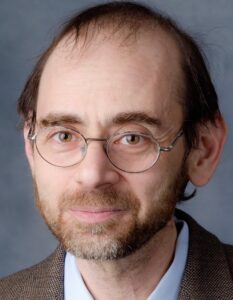Kenneth Berenhaut is a Professor in the Department of Mathematics and Statistics at Wake Forest University in Winston-Salem, NC. His research interests are broadly focused on areas related to applied probability, discrete dynamics, network science, convergence rates, mathematical inequalities and discrete structures. Influenced heavily by his interactions with valuable mentors during his years as a student, he took the opportunity to begin working closely with students. His first manuscripts co-authored with students appeared in 2005, and since then he has published over 60 papers with undergraduate and/or masters students (out of 77 total). Twenty-two of these papers have been with undergraduate co-authors (for 18 of these he was the sole faculty co-author). He appreciates the opportunity to involve undergraduates and beginning graduate students in joint work. In almost all cases his co-authored work is their first exposure to the process of publishing in scholarly journals, including manuscript preparation, responding to referees, and eventual publication.
Dr. Berenhaut has been vigilant regarding looking for opportunities wherein his students can have the opportunity to present their research. Students of his have attended and presented at a variety conferences, including ones in Greece, Japan, Britain, Poland, Germany, Spain, Canada and Mexico, as well as several in the United States. His research students have gone on to doctoral programs at institutions such as Johns Hopkins University, University of Chicago, Emory University, Georgia Tech, UC San Diego, University of Illinois, Bryn Mawr, NC State, UT Austin, Tulane University, University of William and Mary and University of Toronto, as well as successful careers in business and industry.
In 2007, with support from Wake Forest, he founded Involve, A Journal of Mathematics, with the goal to provide a venue to highlight the results of quality collaborations between faculty and students at all levels. Papers published in Involve must have a minimum of 1/3 student authorship. To date the journal has published more than 50 issues (and in excess of 500 papers). The editorial board consists of mathematical scientists committed to nurturing student participation in research; the journal is published through the nonprofit Mathematical Sciences Publishers at the University of California, Berkeley. He has found great pleasure over the years encountering many young faculty who published their first papers in Involve, during their student years.
Wake Forest has been supportive of his interest in research with students, through funding for his students, support for Involve in the early years, and recognition for his work. He received the 2006 Wake Forest University Excellence in Research Award, the 2011 Russell D. and Elfriede Hobbs Award for Entrepreneurship, and the 2016 Wake Forest University Award for Excellence in Mentored Scholarship. In 2017, he was awarded the Wake Forest University Graduate Faculty Excellence Award, and on July 1, 2019, he will begin a three-year term as Baker Family Faculty Fellow. Berenhaut holds B.A and M.Sc degrees from the University of Manitoba in Winnipeg, Manitoba, Canada and M.A and Ph.D. degrees from the University of Georgia, in Athens, GA.
A colleague mentions that “The pace and depth of Ken’s mentorship has demonstrably had a hand in building our department’s culture of valuing undergraduate research experiences.” One of his students states that “I’ll still carry with me the lessons and work ethic Dr. Berenhaut instilled within me. And it’ll bring me the utmost pleasure to always be one of his students.” Another mentions “There is no doubt that my success in my career is a by-product of the character and work ethic that Dr. Berenhaut instilled in me. He is an amazing mentor and professor for the chief reason that he puts the Wake Forest student first. I can personally attest to the fact that my dreams and aspirations in the fields of statistics and data science were kindled by his instruction and leadership. I am always impressed by his commitment to students and his hope for their happiness.”

